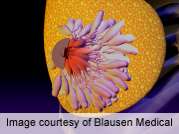For women with estrogen receptor-positive early breast cancer, continuing tamoxifen to 10 years correlates with reduced risk of recurrence and lower breast cancer-specific and overall mortality, according to a study published online Dec. 5 in The Lancet to coincide with presentation at the annual San Antonio Breast Cancer Symposium, held from Dec. 4 to 8.
(HealthDay)—For women with estrogen receptor (ER)-positive early breast cancer, continuing tamoxifen to 10 years correlates with reduced risk of recurrence and lower breast cancer-specific and overall mortality, according to a study published online Dec. 5 in The Lancet to coincide with presentation at the annual San Antonio Breast Cancer Symposium, held from Dec. 4 to 8.
Christina Davies, M.B.Ch.B., from the University of Oxford in the United Kingdom, and colleagues assessed the effect of continuing adjuvant therapy with tamoxifen to 10 years instead of stopping at five years. A cohort of 12,894 women from the worldwide Adjuvant Tamoxifen: Longer against Shorter trial, who had early breast cancer had completed five years of treatment, were randomly allocated to continue treatment to 10 years or stop at five years (open control). The effects on outcome were reported for the 6,846 women with ER-positive disease.
The researchers found that continuation of tamoxifen correlated with significant reductions in the risk of breast cancer recurrence, breast cancer mortality, and overall mortality. The reductions were less extreme before year 10 compared with after year 10 (recurrence rate ratio, 0.90 during years five to nine and 0.75 in later years; breast cancer mortality rate ratio, 0.97 during years five to nine and 0.71 in later years). During years five to 14, the cumulative risk of recurrence was 21.4 percent for women allocated to continue tamoxifen and 25.1 percent for controls, and breast cancer mortality was 12.2 and 15.0 percent, respectively. Long-term follow-up is ongoing.
"These results, taken together with results from previous trials of five years of tamoxifen treatment versus none, suggest that 10 years of tamoxifen treatment can approximately halve breast cancer mortality during the second decade after diagnosis," the authors write.
The study was funded in part by AstraZeneca.
More information:
Abstract
Full Text (subscription or payment may be required)
Editorial (subscription or payment may be required)
More Information
Journal information: The Lancet
Copyright © 2012 HealthDay. All rights reserved.




















